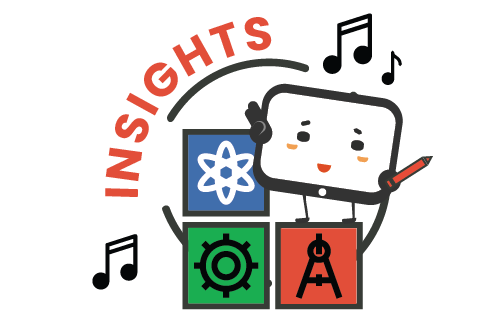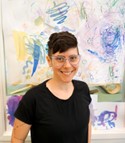Creating Community Partnerships for High Quality Early STEM Learning
Posted on April 9, 2023 in Insights

This blog post shares some of our experiences at STEMIE in partnership with Kidzu Children’s Museum in Chapel Hill, NC. Collaborating on the development of an innovative, inclusive space for infants, toddlers and their caregivers in the museum called The Nest, creating early STEM learning experiences, and strengthening our partnership with Kidscope Early Learning Center have been highlights of this partnership.
Early STEM learning is important for each and every child and early STEM learning opportunities are everywhere! We know that there are inequities for many children in accessing early STEM learning including opportunity gaps for children with disabilities or those in underserved communities (Clements et al., 2020; Sarama et al., 2018). Children’s museums are spaces that foster inclusive STEM learning for all community members and we happen to have an amazing children’s museum right here in Chapel Hill, North Carolina. Kidzu embeds STEM and inclusion into learning spaces for young children, including a space, The Nest, designed specifically for infants and toddlers to engage in inclusive STEM learning experiences with each other and their educators and caregivers.
Kidzu and STEMIE began partnering around the idea of increasing access to high quality early STEM learning for all of our youngest learners and their educators and caregivers. When The Nest was complete, the Kidzu team began inviting local early care and education centers to visit the center on a regular basis, setting the stage for Kidzu to serve as an incubator site for STEMIE. As one of our STEMIE incubator sites, we collaborate and test out investigations with infants and toddlers and their educators to inform STEM learning trajectories in development at STEMIE. These playgroups serve to empower both the infants and toddlers and their early care and education providers in their confidence and competence in teaching and learning STEM concepts.
We have completed our first cycle of playgroups with two classes (one infant class and one two’s class) who visit The Nest every week, on alternating weeks. Over the course of ten months, we explored concepts such as force and motion, sounds, causation, sequences, and textures/properties of matter through play and exploration of different materials and activities tailored to each class’s specific interests. Every week we learn more about how our youngest learners think about and explore these concepts and activities. It is amazing to be able to so closely observe the thought process and problem solving skills of a one year old, for example, working through how to grasp and then drop a ball!
The STEM learning that we observed and documented during the playgroups will be used to inform outreach boxes that Kidzu is developing to send to early childhood educators across the state. These boxes will include specific STEM materials and other resources for educators to incorporate into their learning strategies.
These resources use evidence-based approaches in early STEM learning to provide educators with ways to introduce STEM concepts into their classrooms and are aligned with the North Carolina Foundations for Early Learning and Development Standards. Having easy access to these age-appropriate and STEM educational resources will foster healthy childhood development for underserved families, lessening opportunity gaps, and ultimately leading to more children entering kindergarten STEM-ready. We are grateful to the Kenan Charitable Trust for their continued support of this project.
We are also exploring funding opportunities to conduct systematic research studies focused on inclusive early STEM learning for all young children and families/caregivers in our community and beyond.
In sum, we have collaborated together to extend purposeful and intentional inclusive early STEM learning for our youngest learners in informal learning spaces. It has been amazing to see our visitors engage, grow, and become empowered STEM learners each week. Some questions to consider:
1. How might you be able to support early STEM learning for all young children?
2. Is there a local informal learning space with which you may have an opportunity to collaborate?
3. Do you have ideas for setting up inclusive informal STEM learning spaces?


Technical Assistance Specialist at UNC’s FPG Child Development Institute and Program Coordinator for the Master in Education for Experienced Teachers in Early Childhood Intervention and Family Support at the School of Education at UNC Chapel Hill.
References:
Clements, D. H., Vinh, M., Lim, C., & Sarama, J. (2020). STEM for inclusive excellence and equity. Early Education and Development, 1-24. doi:10.1080/10409289.2020.1755776
Sarama, J., Clements, D. H., Nielsen, N., Blanton, M., Romance, N., Hoover, M., . . . McCulloch, C. (2018). Considerations for STEM education from PreK through grade 3. Retrieved from Education Development Center, Inc.website: http://cadrek12.org/resources/considerations-stem-education-prek-through-grade-3



